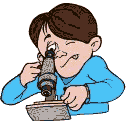Instructions on canceling this newsletter can be found in
the header of this email AND at the bottom of this message.
 |  |
|
|
Today’s newsletter is made possible by:
https://www.surfnetkids.com/sciencefair.htm Each year there’s a fresh batch of them, but the pleas are all very similar. “Help! My daughter needs a science fair project. Can you suggest one?” My answer is always the same. I make it a point not to do my own kids’ schoolwork — so don’t expect me to start doing your children’s homework. But I do know where your kids can go for ideas that will get their own creative juices flowing. And that I’m very willing to share. BrainPop: Scientific Methodhttp://www.brainpop.com/specials/scientificmethod/
Before you begin your project, you’ll need a good understanding of the scientific method. And this fun Brain Pop animation is the perfect place to start for an example of how the four steps of the scientific method (observation, hypothesis, prediction, experiment) are used to solve real-life mysteries. (“Who’s been eating my peanut butter?”) After the movie, try your hand at the quiz. Kids Guide to Science Projectshttp://setmms.tusd.k12.az.us/~jtindell/
“So, you’ve been assigned a science project and you don’t know where to begin. Well, a science experiment is nothing more than a way to solve a problem. These pages have been created to give you some ideas and resources, show you how to start, and take you step by step through the scientific process.” Joan Tindell, a middle-school science teacher from Arizona, explains it all – very well. Science Fair Centralhttp://school.discovery.com/sciencefaircentral/
Although there’s lots of fun science stuff to peruse here, you’ll find the meat of the matter in the Handbook section written by Janice VanCleve, author of more than forty books on science and science fairs. “A science project is like a mystery in which you are the detective searching for answers. Science projects let you practice and exhibit your detective skills. You not only get to select which mystery to solve, but you can creatively design methods for uncovering clues that will lead to the final revelation of who, what, when, where, how, and why.” Science Hunthttp://www.sciencehunt.com/
Science Hunt is produced by Hunt, the company that makes those cool stand-all-by-themselves project display boards. So in addition to sections on picking and planning a science project, it has a good chapter on how to display your finished work including design tips and lots of examples from other kids. You can even send in a photo of your own science project (using a Hunt display board) for posting on the site. What Makes a Good Science Fair Project?http://www.usc.edu/CSSF/Resources/Good_Project.html
|







